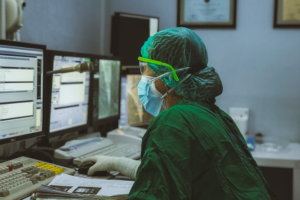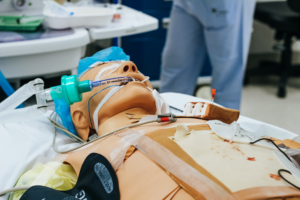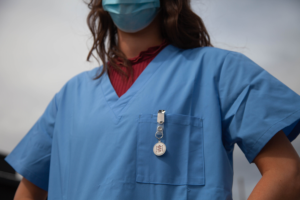
MSN Programs in New Jersey
By EveryNurse Staff on January 17, 2023

As an important part of the healthcare system, the nurse anesthetist is trained to care for patients undergoing both planned procedures and medical emergencies. In order to assume the responsibilities that such a job entitles, he or she must take specialized advanced courses to earn a Master of Science in Nursing. Attending an MSN program in New Jersey is one of the ways that RNs can obtain the training and credentials needed to work with patients in need of anesthesia. This type of advanced degree is also required for family nurse practitioners, nurse midwives, educators, and nurse leaders.
Schools With MSN Programs in New Jersey
- Students attending the Master of Science in Nursing Program at Fairleigh Dickinson University will receive instruction through the school’s Henry P. Becton School of Nursing and Allied Health. Clinical tracks that a student may follow include Adult Nurse Practitioner (30 credits), Adult Nurse Practitioner with an Administrative or Education focus (39 credits), Family Nurse Practitioner (38 credits), Forensic Nursing (42 credits), and Psychiatric/Mental Health Nurse Practitioner (43 credits). Nonclinical track MSN programs to consider include Nurse Educator (33 credits) and Nursing Information Systems (32 credits).
- When nurses pursue an advanced degree at Seton Hall University, they get a chance to concentrate their studies to become an Adult/Gerontological Nurse Practitioner (48-credit, eight-semester program – including 3 summer courses), Nursing Case Manager or Administrator (blending online learning with internship experience), Health Systems Administrator (33-credit program often completed in 24 months – full-time, or 30 months – part-time), Pediatric Nurse Practitioner (43-credit four-semester program), or Nursing Educator (prepares nurses with a master’s degree in advanced practice for a teaching role).
- Monmouth University is home to a CCNE-accredited MSN program that requires the completion of 36 to 45 credits, depending on the chosen specialty of a nurse. A student will encounter three primary areas of the MSN program, which includes a graduate nursing core centered on theory and research; a concentration; and an in-depth study and practice regarding a chosen area of specialization. With class instruction offered through the University’s School of Nursing, students may concentrate their studies on Family Psychiatric and Mental Health Nurse Practitioner, Adult and Gerontological Nurse Practitioner, Family Nurse Practitioner, Nursing Administration, Nursing Education, School Nursing, and Forensic Nursing. The program is offered for both full and part time students.
- The MSN program at the College of New Jersey focuses on accommodating nurses with an interest in becoming a nurse practitioner or leader within the industry. The CCNE-accredited curriculum also offers a RN-to-MSN Bridge Program, which requires students to complete four undergraduate course units (such as Professional Role I or II) before transitioning into the Master of Science in Nursing program. The Clinical Nurse Leader track is comprised of 34 ½ credits of graduate nursing courses (such as Theory and Research for Advanced Nursing Practice), in addition to 560 clinical practicum hours. The school offers three Nurse Practitioner MSN tracks: Family (47 credits), Adult/Gerontological Primary Care (44 credits), and Neonatal (38 credits).
- Saint Peter’s University offers two options for graduate level nursing studies which are offered at the Englewood Cliffs campus: Primary Care: Adult Nurse Practitioner, and Case Management (with a concentration in Nursing Administration). To get an MSN in Case Management, nurses follow a trimester calendar that is ten weeks in length. Final exams are taken in the eleventh week. The MSN Primary Care (Adult Nurse Practitioner) program follows a combined semester (15 weeks) and trimester (11 weeks) schedule, where continuous enrollment is expected of students. Full-time students generally finish the MSN Program in 2 2/3 years with a maximum time frame of 5 ½ years. The University also offers an RN to MSN Bridge Program for nurses holding a bachelor’s degree in a field other than nursing; these students do not earn a BSN and instead, skip right to obtaining a MSN degree.
- The Master of Science in Nursing Program at the College of Saint Elizabeth requires the completion of 37 credits of coursework in order to earn an advanced degree. The NLNAC-accredited curriculum consists of a multidisciplinary core of classes accompanied by advanced study in nursing education and the completion of two clinical practicum courses. Examples of core courses include a Graduate Writing Seminar, Ethical Issues in Human Service Leadership, and Integrative Health Teaching. An RN-to-MSN Bridge Program additionally welcomes nurses with a baccalaureate degree in any field from an accredited institution to pursue a graduate-level degree.
- The College of Nursing at Rutgers University is home to an MSN degree program in Nursing Leadership, which typically takes 15 months with full-time study to complete, or two to three years with part-time study. The majority of the graduate nursing courses are completed online with some requiring in-person meetings a few times during the semester. Other courses meet face-to-face each week. A prerequisite that nurses must meet before applying to the program is successfully completing a descriptive/inferential statistics course.
- Felician College offers online instruction for nurses looking to earn an advanced degree accredited by the Commission on Collegiate Nursing Education. Expanding upon a foundation build upon Franciscan values, the College caters to nurses with an interest in becoming a nurse practitioner, educator, or leader within the industry. The Education track is comprised of 42 credits, including eight professional core courses (24 credits), 60 clinical hours, and 60 practicum hours. Those entering the Executive Leadership track will complete a 36-credit program that blends traditional classroom instruction with online learning that includes 500 project hours. Aspiring nurse practitioners often complete their program in as little as two years and may choose to complete 600 clinical hours and 43 credits for the Adult-Gerontology track, or pursue the 46-credit Family track which includes 780 clinical hours.
Level Up Your Career
New Jersey MSN Checklist
- Hold an unencumbered, current Registered Nurse (RN) license in New Jersey.
- Complete an MSN degree program from an accredited school, including the fulfillment of requirements for supervised clinical hours, if applicable.
- Request an application to become an advanced practice nurse via email, and pay fees to the New Jersey Board of Nursing (~ $100); note that additional fees apply for certification.
- Arrange for college or university to send original official transcripts to the Board to prove compliance of educational requirements.
- Submit proof to the Board of passing the highest level national Advanced Practice Nurse Examination in the area of clinical specialty.
New Jersey MSN Salary & Job Outlook
The U.S. Bureau of Labor Statistics (BLS) identifies New Jersey as one of the top five highest-paying states in the U.S. for medical and health service managers, who stand to earn a median annual salary of $110,340. The state consistently pays a higher median salary for a great deal of MSN-degree related occupations, such as nursing instructor and teacher ($81,160) and nurse practitioner ($101,030), whose salary is greater when compared to the rest of the nation. Nurse midwives in New Jersey earn $99,540.







